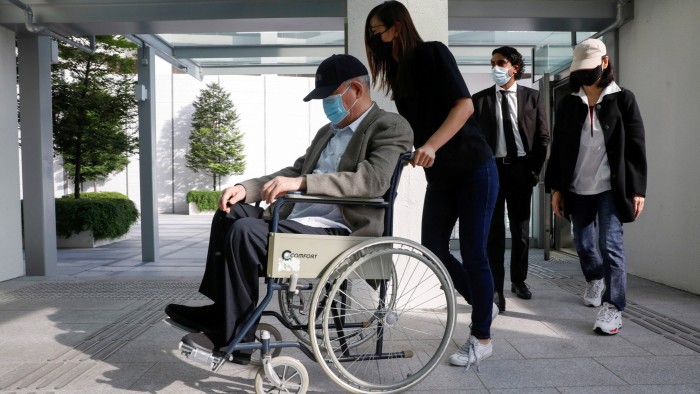After a series of scandals at the height of the Covid pandemic, Singapore’s efforts to rein in its commodity trading sector have resulted in a lengthy prison sentence for a former oil trader now in his 80s.
Lim Oon Kuin – known as OK Lim, and once one of Singapore’s richest men – was found guilty in May of defrauding HSBC and abetting forgery. The 82-year-old was sentenced to 17 and a half years in prison in November in a ruling the judge said was intended as a “deterrent”. Lim’s lawyer has appealed, citing his wheelchair-bound client’s age and poor health.
The harsh punishment is an example of how Singapore has tried to tackle dodgy trading in the commodities market. It has launched initiatives aimed at digitizing the documentation that forms the backbone of the commodities market, while encouraging broader information exchange between market players to prevent fraud.
“Singapore has realized that they need to go a step further and rebuild their credibility,” said Jean-François Lambert, founder and partner of consultancy Lambert Commodities. “They are taking these scandals more seriously.”
Singapore owes its reputation as a global commodities hub to its position on the sea lanes connecting China to global markets, along with its government’s business-friendly approach.
Global trading houses including Trafigura, Vitol Group, Gunvor and Mercuria all have bases in the city, Asia’s largest oil trading center and one of the world’s largest for agricultural commodity trading. The city-state also has its sights set on becoming a hub for the fast-growing carbon trading industry.
The need to differentiate has become even more urgent following Dubai’s rapid rise as a trading hub for commodities, especially for Russian goods under sanctions by Western governments.
“The long arc of global history is full of stories of ports that flourished and prospered for decades, only to decline under changing circumstances,” Prime Minister Lawrence Wong said at an event at Singapore’s mega Tuas Port project in October. “The lesson is that we cannot be complacent.”
The Lim case, along with several others in Singapore, came to light in 2020 as commodity prices fell at the onset of the Covid pandemic. Lim’s company, Hin Leong, collapsed in April 2020 and he admitted hiding $800 million in losses from creditors, including some of the world’s largest banks.
It was the largest of several trading houses in the city-state that imploded that year. Others included oil trader ZenRock and Agritrade International, a trader accused of fraud by its lenders. Hontop Energy, the trading arm of a Shandong-based refinery, was put into receivership and accused of “suspicious transactions” by its largest lender.
A common theme of the scandals was questionable paperwork, which was used to secure credit from financial institutions to hide losses and make leveraged bets on commodity prices. Banks were willing to lend money to the traders in anticipation of high fees.
“Paper documents have always been the Achilles heel of international trade,” says Baldev Bhinder, director of Blackstone & Gold, a specialist energy and resources law firm in Singapore.
Lim was found guilty of encouraging his executives to forge two documents purporting to be oil sales contracts, leading to HSBC paying out nearly $112 million to the company.
At the time of the collapse, Hin Leong had a debt of US$3.85 billion. HSBC had the largest exposure at $600 million, followed by ABN Amro at $300 million, while French lender Société Générale had lent the company $240 million. Singaporean banks – DBS Group, OCBC Bank and United Overseas Bank – had exposures worth $680 million.
HSBC also lent $49 million to ZenRock, but reported the bankrupt trader to Singapore police for what it described as “unfair practices”.
Agritrade appeared to have received $1.5 billion in credit from 26 lenders. Creditors accused the company of fraud by issuing duplicate bills of lading – the legal documents that trucking companies provide to shippers – to multiple banks as security for loans.
“Prosecutors are taking a more proactive approach,” said Kit Smith, a British lawyer specializing in global fraud and trade disputes at Keidan Harrison. “There is a push to be tougher on large sum fraud and to provide examples of the perpetrators.”
Enterprise Singapore, the government agency charged with promoting business, said there is “zero tolerance for fraudulent activities in Singapore”.
“The fraud incidents observed in the commodity trading sector in the past have been attributed to weak disclosure practices and internal controls at a minority of trading companies,” the report said in a statement to the Financial Times.
“If Singapore authorities discover financial fraud in the trading sector, we will take immediate action to hold perpetrators accountable, as we have seen in the case of Hin Leong.”
The government has also launched a series of initiatives in recent years to prevent fraudsters from defrauding creditors.
This includes a trade finance register to prevent the same asset being pledged to different institutions as security for more than one loan. The government has also tried to encourage traders to move away from paper documentation and instead exchange digital data on a public blockchain to reduce counterfeits.
While Lambert said Singapore was “raising the stakes on compliance and regulatory requirements”, he added that regulators should have been stricter in previous accounting scandals.
The scandals have also forced banks to take a much stricter approach to lending to commodity traders. Several lenders have announced that they will withdraw from the market in 2020.
“Banks are now approaching their customers with much more vigilance, which is a good thing, but it has meant that smaller merchants are finding it more difficult to raise financing,” Bhinder said.
“Lim’s conviction closes a chapter for Singapore and the commodity trading market – it has been a learning experience for everyone.”

